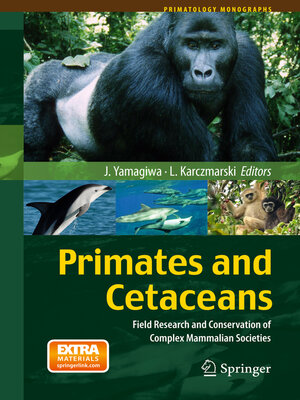Primates and Cetaceans
ebook ∣ Field Research and Conservation of Complex Mammalian Societies · Primatology Monographs
By Juichi Yamagiwa

Sign up to save your library
With an OverDrive account, you can save your favorite libraries for at-a-glance information about availability. Find out more about OverDrive accounts.
Find this title in Libby, the library reading app by OverDrive.



Search for a digital library with this title
Title found at these libraries:
| Library Name | Distance |
|---|---|
| Loading... |
In this book, the editors present a view of the socioecology of primates and cetaceans in a comparative perspective to elucidate the social evolution of highly intellectual mammals in terrestrial and aquatic environments. Despite obvious differences in morphology and eco-physiology, there are many cases of comparable, sometimes strikingly similar patterns of sociobehavioral complexity. A number of long-term field studies have accumulated a substantial amount of data on the life history of various taxa, foraging ecology, social and sexual relationships, demography, and various patterns of behavior: from dynamic fission–fusion to long-term stable societies; from male-bonded to bisexually bonded to matrilineal groups.
Primatologists and cetologists have come together to provide four evolutionary themes: (1) social complexity and behavioral plasticity, (2) life history strategies and social evolution, (3) the interface between behavior, demography, and conservation, and (4) selected topics in comparative behavior. These comparisons of taxa that are evolutionarily distant but live in comparable complex sociocognitive environments boost our appreciation of their sophisticated mammalian societies and can advance our understanding of the ecological factors that have shaped their social evolution. This knowledge also facilitates a better understanding of the day-to-day challenges these animals face in the human-dominated world and may improve the capacity and effectiveness of our conservation efforts.







